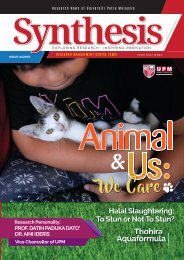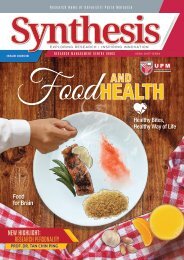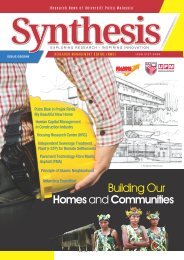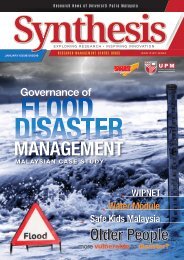SYNTHESIS 3 2019: LANGUAGE COMMUNICATION AND CULTURE
COMMUNICATION has existed since the beginning of mankind, but it was not until the 20th century that people began to study the process. Language is central within a cultural system, shapes speakers’ different assumptions and world views, and is key to communication. It is no doubt that communication plays a very important role in everyone’s life as it can act as a source of information, help people to socialise, and alter an individual’s attitude. Communication and other social sciences researchers draw on each other’s works to study language and culture. During the European Middle Ages and Renaissance period, grammar, rhetoric, and logic constituted the entire trivium, which is the base of the system of classical learning in Europe. The use of various research methods and theoretical frameworks has also resulted in a rich interdisciplinary nature of the work. Therefore, the main goal of this issue is to sketch the negotiations of the areas, and the study of language and culture in the communication disciplines among our researchers.
COMMUNICATION has existed since the beginning
of mankind, but it was not until the 20th century
that people began to study the process. Language
is central within a cultural system, shapes speakers’
different assumptions and world views, and is key to
communication. It is no doubt that communication plays
a very important role in everyone’s life as it can act as a
source of information, help people to socialise, and alter
an individual’s attitude. Communication and other social
sciences researchers draw on each other’s works to
study language and culture. During the European Middle
Ages and Renaissance period, grammar, rhetoric, and
logic constituted the entire trivium, which is the base of
the system of classical learning in Europe. The use of
various research methods and theoretical frameworks
has also resulted in a rich interdisciplinary nature of the
work. Therefore, the main goal of this issue is to sketch
the negotiations of the areas, and the study of language
and culture in the communication disciplines among our
researchers.
You also want an ePaper? Increase the reach of your titles
YUMPU automatically turns print PDFs into web optimized ePapers that Google loves.
Research Highlights
Warisan Alam Budaya &
Reka Bentuk Islam
WARIS Research Group was established in
2013 by a group of academicians who have the
passion to work and research on preserving
the built environmental heritage. They named
themselves as the Cultural and Heritage
Research Groups (CHRG). This research
group initially involved two lecturers from the
Department of Architecture and three lecturers
from the Landscape Architecture Department in
the Faculty of Design and Architecture, Universiti
Putra Malaysia. CHRG is among the pioneers
to actively stimulate research and knowledge
management on Malaysian Culture and Heritage
in UPM. In 2015, this group underwent a rebranding
and strategising effort, with bigger
responsibilities and excitement to move forward
in the local and international level.
This fresh and innovative re-branding process also
welcomes another two new members from the Department
of Industrial Design, FRSB. A total of seven multidisciplinary
members are now proud to be known as the
member of WARIS Research Group. WARIS is the acronym
of “Warisan Alam Budaya dan Rekabentuk Islam”, reflecting
our passion and motivation in culture and heritage studies.
WARIS Research Group is responsible to systematically
document, analyse and disseminate the intrinsic quality of
the authentic culture and fragile heritage as a lesson to be
reconstructed in the modern and contemporary culture and
community.
The International ISI & Scopus Index Conference on
Science, Engineering and Built Environment (ICSEBS) 2014
in Denpasar, Bali was the event that brought these seven
researchers to work together until today. The collaboration
and working spirit between FRSB UPM and The Universiti
Negeri Maulana Malik Malang, Indonesia encouraged
WARIS to continue with the effort of curating the ICSEBS
2015. This conference was organised in Malang, Indonesia
with more collaborators from universities in Malaysia and
Indonesia. 2016 had been great with the 3rd synergy of
organising ICSEBS2016 in Bandung, Indonesia. This time,
WARIS was approached by the University of TELKOM,
Bandung to organise ICSEBS2016 when they learned
about the success of the two previous ICSEBS. In total,
ICSEBS had been successful in publishing more than 500
ISI and Scopus papers for their participants over the past
three years.
The spirit of working together motivated the seven
researchers to obtain more research grants from the
Malaysian Education Ministry and UPM, making them the
largest recipients of research grant amounting to RM2
million. The group published 170 ISI and Scopus papers
and 6 books up until 2019. These research grants are on
the Malay Heritage and Conservation Studies, Traditional
and Vernacular Architecture, Cultural Landscape, Islamic
Design, Bamboo Design and Furniture, Cultural Textile
8 | ISSUE 03/2019










